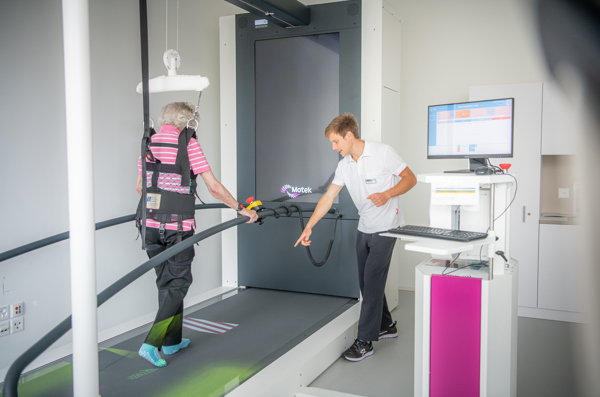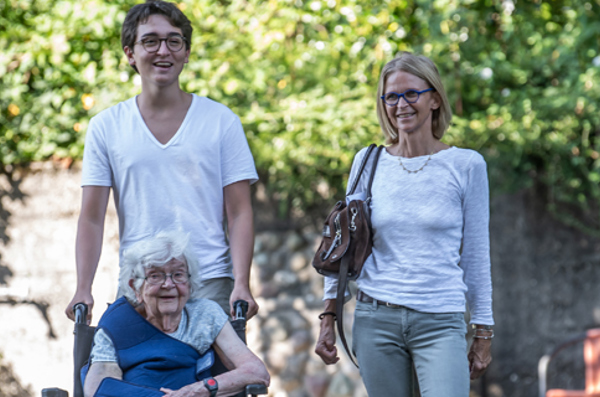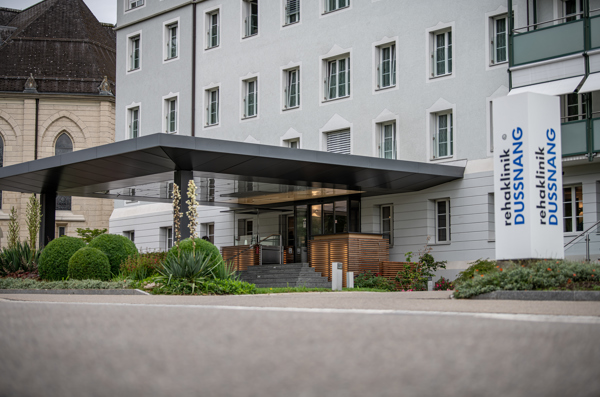

Geriatric rehabilitation
Returning home as quickly as possible and getting back to independent life is usually what older people want the most after an accident, illness or surgery. These goals are also at the heart of geriatric rehabilitation.
Together with our patients, our interdisciplinary team create customised therapy plans that are specifically tailored to meet the individual’s unique situation, goals and specific needs.
In September 2023, we also opened a specialised geriatric trauma unit in order to better attend to the needs of older people after falling. Learn more.
Attention to the specific needs of each patient is central to the success of any treatment. All of our patients are assessed upon admission and discharge. They receive a personalised therapy plan, which is put together by an interdisciplinary team of specialists, psychologists, nurses and therapists. We also provide social and nutritional counselling services.
For more information on nursing and counselling services, see Interdisciplinary Team.
Goals of treatment
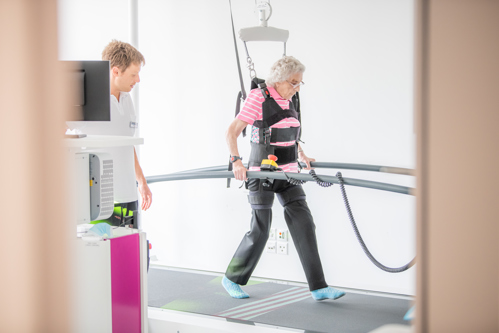
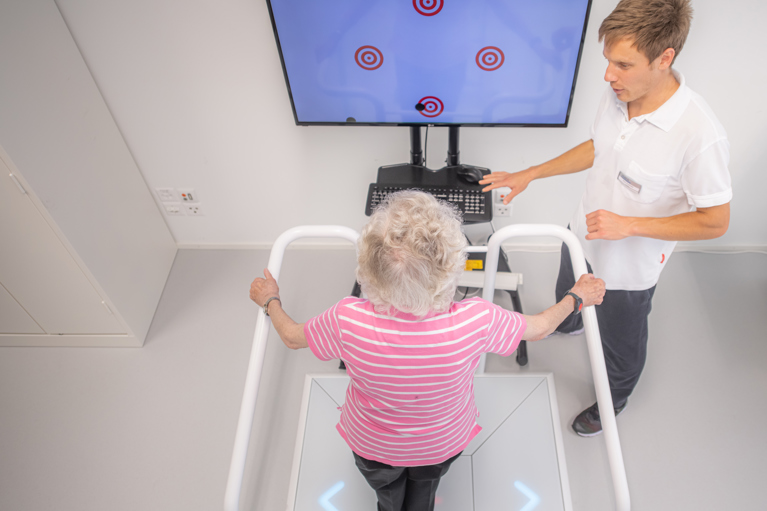
Injury Rehabilitation for Older People
This service includes medical care and injury treatment of elderly patients with due regard to their special needs.
Senior people often have reduced bone mass and muscle strength because of osteoporosis (excessive bone loss) or sarcopenia (age-related muscle loss). This means that injuries that might be less serious in younger people can lead to serious problems in elderly patients, who are more susceptible to such consequences. This is often complicated with other age-related conditions.
To better meet the needs of the older patients after an injury, we opened a dedicated geriatric trauma unit in September 2023. There, we bring together our expertise in geriatrics and musculoskeletal rehabilitation. Here, geriatric and trauma surgery experts collaborate with therapists and nutrition counsellors to offer their patients comprehensive care and achieve the best possible rehabilitation outcomes. In the Rehaklinik Dussnang, we practice up-to-date therapy approaches, which are even more effective thanks to our in-house robotics center. In addition to dealing with injury consequences, we offer an extensive injury prevention program to prevent falling and other cases of age-related trauma.
Thanks to seamless transition from ward treatment to rehabilitation when the time comes, the chances of rehabilitation success increase, and so do the chances of the patients getting back their independence and maintaining their quality of life.
Old age, muscle atrophy, joint problems, and neurological changes can all affect mobility. Older people are more prone to falls because of problems with balance and coordination.
Falls: Falls are one of the most common causes of injury in the elderly. These can be caused by balance problems, vision problems, medication use, poor lighting, slippery floors and obstacles.
Osteoporosis: Osteoporosis is a disease in which bones lose their density and become brittle. This increases the risk of fractures from minor weight bearing or a fall.
Multimorbidity: Older people often have multiple co-occurring health problems. These can affect their ability to avoid or overcome injuries.
Medication use: Certain medications can cause dizziness, lightheadedness or fatigue, which increases the risk of falls.
Declining vision and hearing: impaired vision and hearing can affect perception of hazards and obstacles.
Social isolation: Loneliness and social isolation can result in depression and reduce awareness of one's safety. Home environment: An inadequately designed home environment with poor lighting, loose, unsecured carpets, and lack of handrails can increase the risk of injury.
Lack of physical activity: A sedentary lifestyle leads to muscle loss and poor balance, which increases the risk of falls.
Cognitive decline: Cognitive impairments, such as those associated with dementia, can affect the ability to recognise and respond appropriately to hazards.
Nutritional problems: Poor nutrition and fluid intake lead to weakness and dizziness, which may increase the risk of falls.
Age-related changes in responsiveness: With time, the natural decline in responsiveness and reflexes can affect a person's ability to avoid accidents.
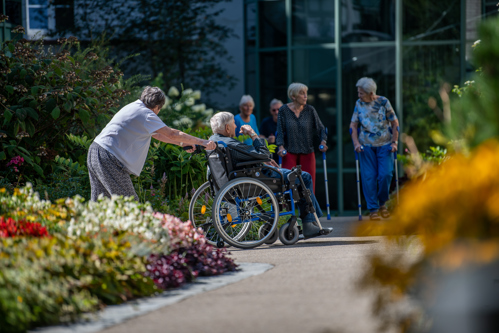
Imaging procedures: Imaging procedures such as X-rays, CT (computed tomography) scans and MRI (magnetic resonance imaging) scans can be used to more accurately visualise, detect and assess fractures, sprains, dislocations and other injuries. These are done by appointment at our partner clinic. Our experts in sonography, including echocardiography, will examine you on-site.
Laboratory tests: Blood tests can provide information about inflammation, infection, electrolyte imbalance and other health conditions that may be relevant to the evaluation of an injury or another medical condition. Our MPA also performs ECG examinations. We also offer 24-hour blood pressure monitoring and long-term ECG examinations if necessary.
Functional Diagnostics: It includes tests to evaluate the patient's mobility, muscle strength, balance and overall functional capacity. This helps to understand the impact of the injury on a patient's mobility and independence.
Fall risk assessment: a targeted fall risk assessment can help to identify underlying factors that could lead to injury. It includes balance testing, vision testing, medication review, and home environment assessment.
Cognitive status: In older people, an assessment of mental abilities is important to detect cognitive impairment at an early stage. Also, it is essential to determine if a person's cognitive impairments could affect their ability to safely deal with injuries or take precautions.
Psychosocial assessment: the patient's psychosocial condition should be assessed too, as social support, mental health, and emotional well-being may play an important role in the injury recovery process.
Interdisciplinary assessment: Due to the complexity of injuries in the elderly, it is often necessary to involve an interdisciplinary team of medical professionals, including physicians, physical therapists, occupational therapists, social workers, and psychologists.
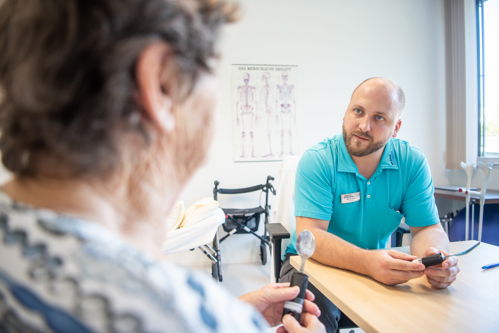
Physiotherapy: Physiotherapy focuses on restoration of mobility, muscle strength and coordination after injuries. Exercises and therapies are customised to improve mobility and train balance in patients to reduce their risks of falling.
Occupational Therapy: Occupational therapy aims to help the elderly perform their daily routines such as dressing, eating, bathing and household chores without assistance. This can help them get back or maintain their independence.
Assistive devices: Assistive devices such as crutches, walkers or prosthetic limbs can improve the patient’s mobility and safety when needed.
Speech therapy: Speech therapy aims to restore and maintain the communication and other functions of the organs used for speaking and swallowing. Medication management: If necessary, medication can be adjusted to minimise adverse effects that could increase the risks of falling. This often requires close collaboration between physicians and pharmacists.
Pain management: injuries are usually accompanied by pain, which can delay the recovery. Effective pain management is important to improve quality of the patient’s life and encourage his or her engagement into the therapy arrangements.
Functional training: the elderly can learn how to move more safely at their place to minimise the risk of falls and injuries. This may include proper lifting, dealing with obstacles, and walking safely.
Fall prevention: preventive measures such as fall risks evaluation, home environment adjustment (trip hazards removal, installation of handrails), and special exercises intended to strengthen muscles and improve balance can reduce the risk of falls materially.
Multidisciplinary cooperation: Close cooperation between our doctors and experts in physiotherapy, occupational therapy, social counselling, nursing and psychology is essential to ensure comprehensive and customised care.
Nutrition counselling: A balanced diet is important for recovery and bone health maintenance. Nutrition counselling can provide recommendations as needed. Psychosocial support: Injuries can have psychological adverse effects. Psychological or social support can help deal with anxiety, depression, or adjustment problems.
Mobilization therapy: This type of care is always customised and has two main goals: to promote independence and preventing trauma risks (e.g., risk of falling). Activation therapy is always adapted depending on the current state of the patient and his/her need for assistance.
Counselling for family members: We will be happy to meet family members of our patients by appointment. Topics to discuss can include fall and injury prevention, orientation and structuring aids to be used in everyday life, training of independent medication taking, dealing with diabetes mellitus (e.g. insulin administration), nutrition, incontinence advice and ways to arrange your own life after our patient’s rehabilitation. Such counselling sessions are arranged in cooperation with our multispecialty team.
Social contacts: Social integration and cultivation of family relationships and friendship are particularly important when taking a rehabilitation course on an in-patient basis. Visitors are therefore always welcome.
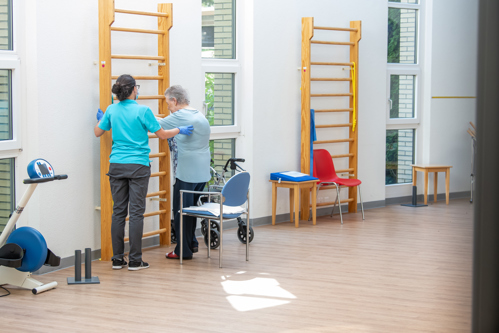
Orthogeriatrics (just like acute geriatrics) provides older people with the opportunity to receive therapy and professional advice from a single source. In accordance with a holistic concept, the multidisciplinary team working with elderly patients consists of specialists (in geriatrics, orthopaedics and trauma surgery), nurses responsible for patient mobilization and rehabilitation, psychologists, physiotherapists, occupational therapists and speech therapists as well as nutritionists.
Our comprehensive range of services includes age-appropriate drug therapy (gerontopharmacology), nutritional counselling, speech therapy, occupational therapy, psychotherapy and physiotherapy, including the use of exercise equipment for the elderly, as well as social counselling.
During the admission stage, a geriatrician and the multidisciplinary team conduct a comprehensive survey assessing the patient’s mobility, risks of falling, emotional state, cognition, nutritional status and social environment. This is done through interviews, physical examination and numerous functional tests. This allows for an accurate evaluation of the patient's individual resources, deficits and needs. The geriatrician reviews the medication schedule and optimises it as necessary, especially to prevent post-operative confusion (delirium). The patient receives several therapy sessions daily as well as additional counselling. These are aimed at restoring mobility and enable social reintegration. The therapy also includes strength and balance exercises, as they can significantly strengthen the patient’s muscles as well as improve their stance and gait, thus reducing the risk of falls. Thanks to our robotics center, all the patients – especially those senescent – take the opportunity to have their first gait training session as early as possible. It is often combined with cognitive rehabilitation therapy.
While enhancing physical mobility, cognitive therapy also promotes mental fitness in case it is needed. Another relevant factor for older patients is nutrition: training sessions prove most effective if the person’s diet is well-balanced and rich in protein. Therapy sessions are led jointly by surgeons and geriatricians.
The multidisciplinary team have regular meetings to discuss the results of therapy and determine the steps which should be taken next. If necessary, experts from other departments can be called in.
Nutritional and Medication Management: A balanced diet and appropriate medication management are important to support the patient's recovery and promote bone and overall health.
Psychosocial support: injuries can impact the patient's emotional wellbeing. Psychosocial support, including psychotherapy and social counselling, is important to promote patients' emotional health.
Health promotion and prevention: gerontotraumatology also highlights the importance of health promotion and prevention of disease. These include regular exercise, healthy eating, and avoiding risks.
Preventive measures: In addition to treating injuries, gerontotraumatology also places great emphasis on preventive measures to make sure patients avoid injuries in the future. This can be achieved through education, counselling, and lifestyle adjustments.
Rehabilitation and Physiotherapy: Restoring mobility, strength and function after an injury is an important focus of any rehabilitation plan. Special exercises and physiotherapy treatments are able to enhance recovery and help patients regain independence.
Physiotherapy/gait analysis: Physiotherapy includes strength and movement exercises, balance tests as well as gait analysis.
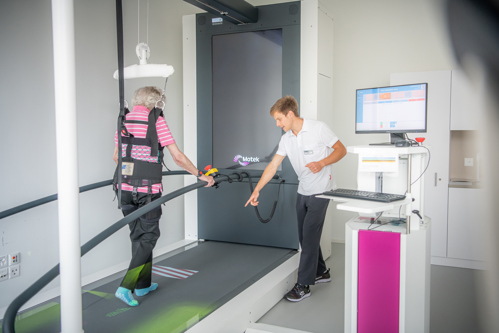
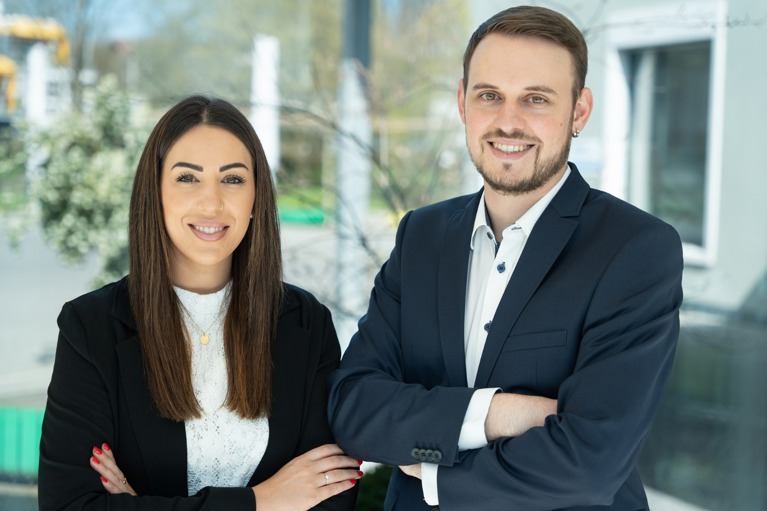
Contact
International Office
Kerstin Rizzello & Luca Zimmermann
Tel.: +41 71 424 33 66
E-Mail: international@vamed.ch
Medical personnel
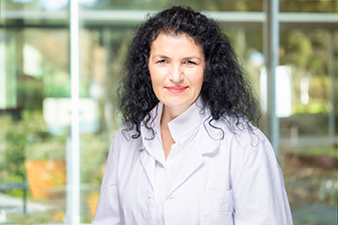
Alena Schütte, Dr. med. univ. (BiH)
Dr med. univ. Specialist in general internal medicine,
specialising in geriatrics, head physician for geriatric rehabilitation, member of the clinic management
Tel.: +41 71 978 63 71
E-Mail: CA-sekretariat@rehaklinik-dussnang.ch
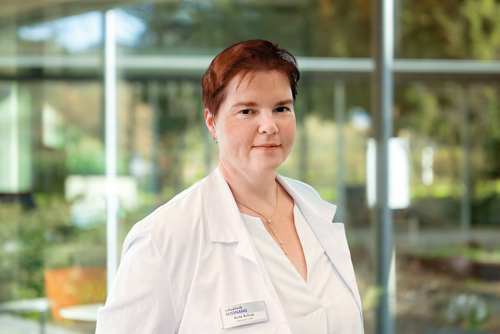
Anita Schulz
Surgery Specialist
Head Physician, Gerontotraumatologic Rehabilitation
Tel.: +41 71 978 63 71
E-Mail: CA-sekretariat@rehaklinik-dussnang.ch
ㅤ


